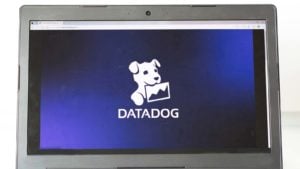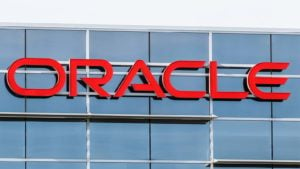
Analysts estimate that the big data sector will expand at a CAGR of 13.5% between 2022 and 2030. By the latter year, the sector’s sales will come in at a huge $745 billion. Moreover, forms of AI such as machine learning can spot patterns across large volumes of data. And these patterns, in turn, can produce insights which enable firms to more effectively recruit customers, develop better products and increase their productivity. Given these points, big data and the companies that can extract it will become increasingly valuable over the longer term. Here are three strong buy big data stocks.
MongoDB (MDB)

MongoDB (NASDAQ:MDB) has created a popular document-oriented database. The firm charges for its cloud-based database, called Atlas, based on the amount of data which its customers utilize. Moreover, Atlas has become very popular among users of the public cloud, Atlas’ revenue is already growing at an annual clip of nearly 33%. And it already generates 68% of the company’s overall sales.
Given these points, I believe that Atlas’ growth will greatly accelerate in the medium and long-term as the amount of data consumed by cloud users increases exponentially in order to support their use of AI. And the acceleration of Atlas’ gains, in turn, should enable the growth of MongoDB’s top and bottom lines to accelerate a great deal as well, enabling MDB stock to outperform.
MongoDB’s PEG ratio was a reasonably attractive 1.46 times as of January 2024. Given MDB’s rapid growth and attractive valuation, I view the shares as one of the best strong buy big data stocks.
Datadog (DDOG)

Datadog’s (NASDAQ:DDOG) monitoring and analytics platform for cloud applications enables its customers to analyze large volumes of data from various sources.
On March 14, Bank of America identified DDOG as one of its “bull stocks,” saying that the shares were undergoing a “‘head and shoulders’ bottom breakout” that could take the shares to $172.
Last quarter, the company’s EPS soared 79% year-over-year to 44 cents. Also noteworthy is that its EBITDA came in at $31.7 million, versus an EBITDA loss of $31.6 million in Q4 of 2022. The huge jump indicates that DDOG, like MDB, is beginning to benefit meaningfully from the proliferation of AI.
I expect the latter trend to intensify in the longer term. Supporting that conclusion, DDOG CEO Olivier Pomel recently stated that the utilization of DDOG’s offerings by AI-focused companies is growing quickly.
Oracle (ORCL)

Database software giant Oracle (NYSE:ORCL) is starting to market AI applications. Specifically, on March 14, the firm unveiled AI tools that will enable its customers to generate data-driven insights. The company correctly noted that with these insights, its customers will be able to improve their businesses. As a result, I believe that the demand for these offerings will be strong.
Also noteworthy is that on March 18 ORCL announced a partnership with Nvidia (NASDAQ:NVDA). Under the deal, the two firms will jointly market Oracle’s AI and cloud offerings, along with Nvidia’s chips and software. Given the huge enthusiasm for Nvidia’s products, the deal should meaningfully increase Oracle’s orders and revenue going forward, as governments and companies will be much more likely to buy Oracle’s systems if they are paired with Nvidia’s products.
Meanwhile, the Street appears to be becoming more upbeat on ORCL stock, as two investment banks recently upgraded the shares in the wake of the company’s Q4 results.
Argus raised its rating on the name to “buy,” citing the firm’s rapidly growing cloud revenue. The company’s cloud infrastructure revenue jumped 49% last quarter versus the same period a year earlier, excluding currency fluctuations. Argus placed a $145 price target on ORCL stock.
Another investment bank, William Blair, raised its rating on the shares to “outperform,” The bank was impressed by the 41% year-over-year increase in the company’s remaining performance obligations, and it expects Oracle’s revenue from AI users to increase meaningfully going forward.
On the date of publication, Larry Ramer did not have (either directly or indirectly) any positions in the securities mentioned in this article. The opinions expressed in this article are those of the writer, subject to the InvestorPlace.com Publishing Guidelines.





